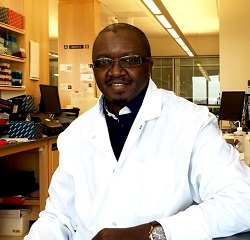
Proteins at centre of breast cancer research
Dr. Kiven Erique Lukong was announced as one of the 11 research grant recipients in the Prairie/NWT Region
By Marg SheridanA recent grant from the Canadian Breast Cancer Foundation (CBCF) has a University of Saskatchewan researcher in the spotlight.
Dr. Kiven Erique Lukong was announced as one of the 11 research grant recipients in the Prairie/NWT Region – and the only recipient in Saskatchewan – taking home a share of the $3.7 million investment.
His research, which will benefit from the $375,000 grant (over three years), centres around a pair of proteins called breast tumor kinase (BRK) and Fyn-related kinase (FRK), and the impact their activation has on breast cancer.
“The interesting thing about the two proteins is that BRK plays a role in tumor progression, while FRK works as a tumor suppressor,” explained Lukong. “We’ve found out that the expression of FRK is generally low in most breast cancer cells, especially in triple-negative breast cancer samples.
“Our main goal for the CBCF project is to find a way that we can turn on the expression of FRK in triple negative breast cancers.”
The idea is that in finding a way to turn on the FRK, Lukong and his team, in collaboration with Dr. Keith Bonham of the Saskatchewan Cancer Agency, will have perhaps found a way to treat triple-negative breast cancer, which is one of the most aggressive forms of the disease, and represents about 10-20 per cent of breast cancers. The triple-negative version of the disease means that the cancer tested negative for all three receptors: estrogen receptor (ER-), progesterone receptors (PR-) and HER2 (HER2-) – which essentially means that the cancer would not respond to hormonal treatments, or those that target HER2.
“Imagine that if we could turn on a tumor suppressor in triple-negative breast cancer that cannot be targeted,” Lukong stressed. “That will help in the treatment of this aggressive form of breast cancer.”
